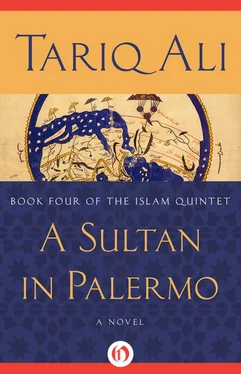Suddenly, from a distance, they heard the sound of people running towards them and hailing them. Uthman froze, his face filled with fear. Idrisi put his arms around his son’s shoulders and told him not to worry, they were friends, not Roman soldiers.
‘Are you sure, Abu? Neither of us are wearing swords.’
A shiny-eyed Elinore and Simeon, his golden locks ruffled by the breeze, both slightly out of breath, stopped running as they saw her father. Uthman smiled and relaxed once again. He liked Elinore and loved hearing Simeon play the flute. Idrisi looked at her and knew instantly that she had something to say but had not expected to find Uthman with him.
‘What is on your mind, child? There are no secrets from your brother.’
‘I will go and sit under the tree, if you like,’ said Uthman.
‘No!’
‘Then speak.’
‘Simeon ibn Thawdor and I have been thinking a great deal. We have come to a decision, but only if it meets with your approval, Abi. We would like to come and live here with Uthman and… if the Trusted One is right about the need to build a church, then Simeon could, when the need arose, don a monk’s robe and hide his flute.’
Uthman clapped his hands in excitement and Idrisi laughed. He was surprised and delighted. What had been worrying him was the thought of Uthman, abandoned by his family and dependent exclusively on retainers. He felt guilty that he had abandoned this boy at a young age. Now his daughter had decided to do what he should have done years ago.
‘A wonderful decision! As long as you are happy here, everyone else will be. But till you need to become a monk, Simeon, you should choose a piece of land and work it.’
‘I will,’ he replied, ‘but first we must build a small church. A single dome, a cross and unadorned, rough wooden benches inside. The map is in my head. It could be used as a school. Elinore is determined to teach the children how to read and write Arabic and Greek.’
‘When will you have the children?’
‘Uthman!’ she shrieked as she stood, legs apart and hands on hips. ‘We’ve only just got married. Give us time. Simeon was talking about the village children.’
‘I am very happy you and Simeon will live here with me. Very happy. We have much to discuss, but now if you will excuse me, I must go and inform my friends.’
When the villagers arrived for the mehfil they were dressed in their best clothes. Idrisi, who knew most of the families, sat with them while they ate and they talked of what the island had been before they had arrived. All that had been grown was wheat. Now they had cotton and silkworms and the sumac tree for tanning and dyeing and our weavers — here they were talking of Noto alone — were the best on the island, if not in the world. A voice added: ‘Noto was the last to surrender and will be the first to rise against them.’
After they had eaten, Idrisi and the Trusted One spoke in turn and explained how they saw the future of the estate. The villagers were overjoyed when Idrisi told them the land would belong to them, but less pleased when the Trusted One gently explained that the path to long-term survival might necessitate a detour via the church.
‘Trusted One,’ a young peasant asked, ‘it is normal to dream of victories and triumphs, but you speak only of defeat. Are you so sure we will be defeated? Our village has pledged fifty young men to fight in the jihad.’
‘My friend,’ replied the Trusted One, ‘it is best to be prepared for everything. I do not know if we shall win or lose. What you do must be your own choice. If we are defeated I am telling you that, as night follows day, so the Lombards will arrive to kill all of you and steal your land. They have been known to kill Greeks as well so the church might not be sufficient protection, but at least it offers you a chance.’
Idrisi introduced Elinore and Simeon to them. He explained without embarrassment how both of them had been baptised and would live in the house with his son, Uthman. He spoke of Elinore’s wish to teach their children to read and write. He advised them to follow the Trusted One’s advice and then, perhaps because he was thinking of Balkis, he quoted a couplet from Ibn Hamdis.
‘Our poet has written: I exhausted the energies of war / I carried on my shoulders the burdens of peace. These burdens remain and it is to lighten the load that the Trusted One suggests that, if it becomes necessary, you hide your true religion. Such periods are not unknown in the history of our people.’
After further discussion agreement was reached and in their presence Idrisi asked the Trusted One to prepare a set of registers, one for the land and the other for the church. And then, as if to confirm their new dreams, Simeon played a joyful strain on the flute and everyone began to clap in rhythm, till a few young bloods rose and began to dance. It was, as Idrisi later told Simeon, a traditional Berber dance that he had not seen performed for many years, memories of life in the distant past.
That night Idrisi took Khalid’s father aside. ‘Umar, you are like a son to me. May I speak frankly with you?’
‘Of course, Abu Uthman. Please.’
‘Khalid is growing fast. Before you know he will be arguing and pleading with you to leave the estate and find his own feet and fortune elsewhere. But I feel the boy lacks a woman’s affection. Have you thought of getting married again?’
‘I have, but I have not yet met or seen a woman who attracts me.’
‘Noto and Siracusa are full of them, their skins the colour of apricot and their laughter like the ripple of a stream. You won’t find anyone on your estate. Get out for a while. Give yourself a chance.’
‘It is good advice and I will see if I can satisfy both you and myself.’
The next morning, Khalid and his father, accompanied by the Trusted One, left the estate and Sakina followed them a few weeks later. Her husband and children had returned the day after the funeral and she felt that it was time to return and tend to their needs.
The house was virtually empty and Uthman was missing his nephew and so Simeon and Elinore had decided not to return with Idrisi the following day to fetch their belongings. ‘All our clothes are already in Siracusa and my aunt Balkis can have them bundled and sent over here. I don’t want to leave Uthman. If we all left the shock might be too much for him.’
‘Please convey my respects and love to my father when you return to Palermo. And tell him I am building a small church. It will please my mother.’
Idrisi embraced and kissed each of them in turn and was deeply affected to see the tears in Uthman’s eyes.
‘Abu, it was a real pleasure to see you after such a long time. Please come again and before twenty years, eight months and four days.’
Idrisi’s eyes were moist as he climbed aboard the cart and it was Uthman who was most in his thoughts as he journeyed back to Siracusa. He recalled how all his love and his hopes had been concentrated on Walid, how it was Walid he took everywhere with him. It was Walid who met the Sultan and travelled to meet old family friends in Shakka and Marsa Ali. It was Walid in whom he had confided. He did not regret that, but was angered now by his failure to understand that Uthman had needed him much more.
Observing the change in Uthman had been a revelation. Perhaps he would write about it in his book to help others who had to deal with abnormal children. In many villages children like Uthman were left in the open to die. They had not done that, but had his care been any better? He had been left in the hands of a deaf woman who had made sure he was fed and clothed. So who could blame him for seeking solace in the animal kingdom? Idrisi found himself wondering whether he should return to the estate for a time. He could complete the Formulary in his own library. Mayya and Afdal could come here as well. It was the turn of the house in Palermo to be empty for a while. And Balkis could come here whenever she wished. The more he thought about this the more it appealed to him. His ship was moored in Siracusa; he would return to Palermo and bring them all to Noto. The harbour was not as large as Siracusa, but fine for his vessel. And perhaps he would take Uthman with him to Venice and surprise Walid. He had been away from Palermo for almost three months — surprising how little he missed the city.
Читать дальше












